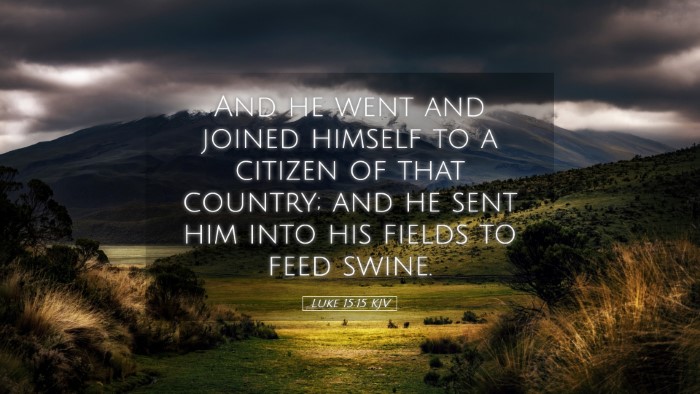Commentary on Luke 15:15
Verse Context: In Luke 15:15, we find the moment when the Prodigal Son finds himself in desperate need. This verse reads, “So he went and hired himself out to a citizen of that country, who sent him into his fields to feed swine.” This passage is significant as it highlights both the physical and spiritual state of the son after his departure from his father’s house.
Historical and Cultural Background
This verse comes from the well-known parable of the Prodigal Son, which reflects Jesus' teaching concerning repentance and grace. In the Jewish culture, feeding the swine represents a grave desperation, as swine are considered unclean animals. Thus, the act of feeding them signifies the extent of the son's degradation and misplaced priorities.
Insights from Matthew Henry
Matthew Henry’s commentary delves into the ramifications of the Prodigal’s choice to leave his father's house. He emphasizes the folly of the young man, who, driven by youthful desire and impatience, squanders his inheritance. When he finds himself in want, Henry interprets this as a divine irony—showing the emptiness of a life that seeks fulfillment outside of the Father’s provision.
- **The Nature of Desperation:** Henry points out that the son hired himself to a citizen of the foreign land. This act was not just a means of survival; it symbolized his alienation from his true identity.
- **Spiritual Symbolism:** The act of feeding swine reflects the moral and spiritual downfall of the son—representative of all those who venture away from God’s grace.
Insights from Albert Barnes
Albert Barnes focuses on the choices made by the son and their consequences. He highlights the harsh reality that comes from foolish decisions outlined in the parable. Barnes notes:
- **Servitude and Freedom:** The Prodigal assumed a role of servitude, illustrating the irony that when one seeks freedom from the constraints of God, one often finds oneself in bondage to sin and this world.
- **Moral Decline:** The son’s decision to tend swine signifies a fall from grace, symbolizing a departure from what is holy and righteous. This point strengthens the understanding of the depths to which he had fallen and ultimately sets the stage for his return.
Insights from Adam Clarke
Adam Clarke presents a theological perspective, analyzing the implications of the son’s actions and the nature of divine grace. He suggests that:
- **The Role of Divine Providence:** Clarke emphasizes that even in the midst of despair, God’s hand is at work. The son’s experiences serve a greater purpose in illuminating his need for repentance.
- **The Call to Repentance:** This state of desperation becomes the catalyst for the young man's return—showing how God can utilize moments in our lives that seem hopeless to lead us back to Him.
Theological Reflections
The first aspect of this narrative reveals the impact of sin's consequences. When we seek to live without reliance on God, we invite instability and degradation into our lives. Luke 15:15 portrays this reality powerfully, as the Prodigal's journey leads him to a place of great need—a physical representation of the spiritual hunger we experience when separated from God.
Secondly, the commentary from these respected scholars reflects the overarching theme of redemption that runs throughout Luke 15. The Prodigal Son’s eventual realization that he needs to return to the Father is a profound reminder to all who stray. His actions mirror the human condition—a consistent yearning for something more, often filled by transient pleasures that ultimately leave us empty.
Practical Applications
For pastors and theologians, this passage offers rich ground for sermon preparation and teachings about grace, repentance, and the nature of God's love. It reminds us that no one is beyond the reach of God's embrace and that every return to Him is met with joy and acceptance.
- Encouragement for the Lost: Luke 15:15 serves as a strong encouragement to those who may feel they have strayed too far from God’s grace.
- Community Reflection: It invites deeper discussion within congregations regarding the nature of sin, repentance, and restoration in the life of a believer.
- Teaching on Consequences: The need to educate about the consequences of bad decisions as a vital part of spiritual formation is underscored here.
Conclusion
In conclusion, Luke 15:15 stands as a striking verse that captures the essence of the human experience—the struggle of pursuing fulfillment apart from God. Through insights from revered commentators like Matthew Henry, Albert Barnes, and Adam Clarke, we find a multifaceted interpretation that encourages both self-reflection and hope.


